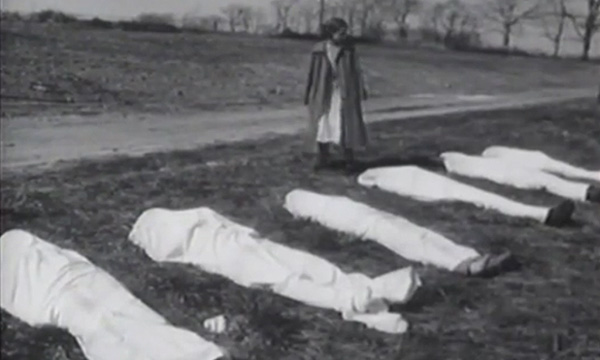Some film critics desperately rack their brains to find all sorts of hidden meanings and implied theories in films. I cannot blame them so much: after all, camouflaging hogwash as clever criticism is their primary source of income. They have to make a living too, you know. I remember when I was a cinema student in Rome and many of the courses I had to take were about feminist theories and cinema. Sometimes the two were not at all connected, at least from what it looked like from the intentions of the filmmaker, but my professor, a scary and rather virile woman, had to attach to the films all kind of speculations involving sexual repression and feminist undertones.
At the time I didn’t have the occasion to study Sara Driver’s films, but I guess my professor would have liked to analyze her works according to her feminist-driven madness. It’s true that films like You Are Not I superficially permit with much ease these interpretations, granting I assume infinite pleasure and fits of unrestrained self-indulgence to critics and theorists alike. Sara Driver though, talking about her work, dismissed the idea she had any feminist purpose at the time. If you want to keep on thinking You Are Not I is a controversial psychoanalitic film about gender conflicts and their effects, feel free to do so, but at your own risk.

You Are Not I was inspired by a story written by Paul Bowles. The plot is, in its basic elements, very simple; it’s not the events as they are, in their cause and effect development, what makes the film the little gem it actually is. Events may not be important at all to the film’s spirit. The complexity of You Are Not I stems from a series of components warping its literal meaning. These components also include the beautifully hypnotic score by Phil Kline, partly previously composed, partly written for the film.
Suzanne Fletcher stars as the main actress. Her ghastly appearance brings to mind images of Dreyer’s tortured heroines; her fixity reminds the spectator of the silent era’s iconic figures and their haunting fascination. Her dramatic close-ups accompanied by almost inexpressive tone of the voice-over are together extremely powerful in their contrast. The main character’s inner voice is constantly engaged in a hushed soliloquy, keeping the viewer attention aware as to not believe everything he sees or hears, generating a sense of internal distress regarding what to expect and how to interpret the story.
After the screening of You Are Not I at this year’s film festival, Sara Driver had a chat with the audience, explaining some of the background details behind the making of the film. Moderator of the discussion was film critic Harlan Jacobson.
We recorded the interview. Here are some excerpts.
More: Part 2 – Part 3 – Part 4
Title: You Are Not I
Year: 1981
Director: Sara Driver
Genre: Drama
Country: USA
Runtime: 48 minutes
Language: English